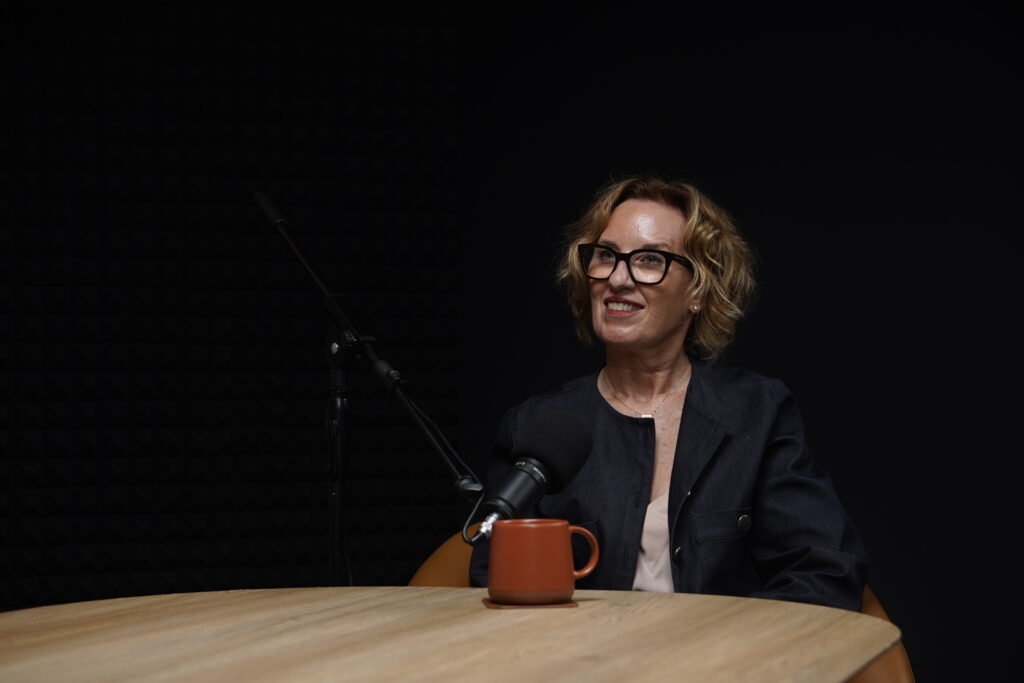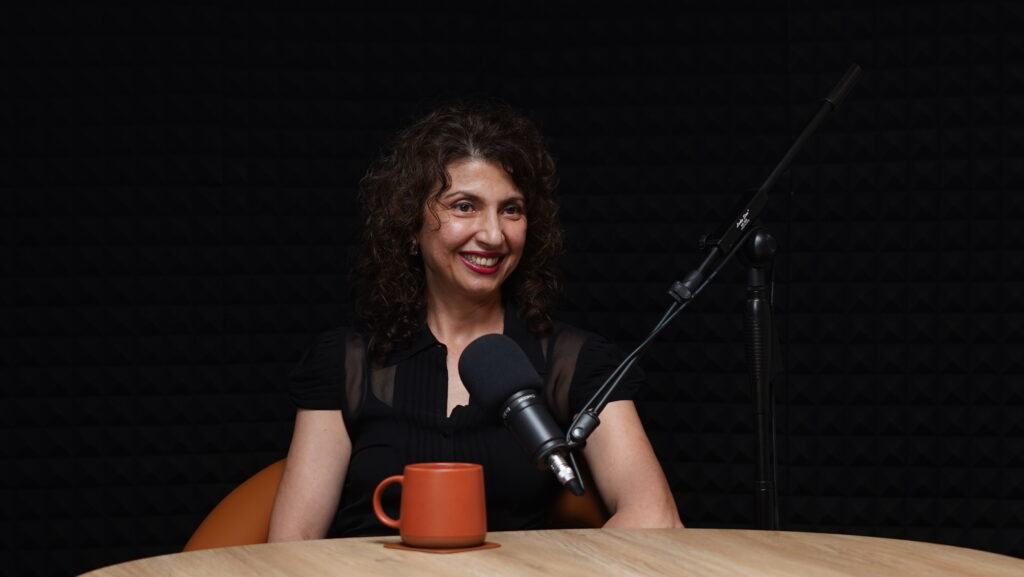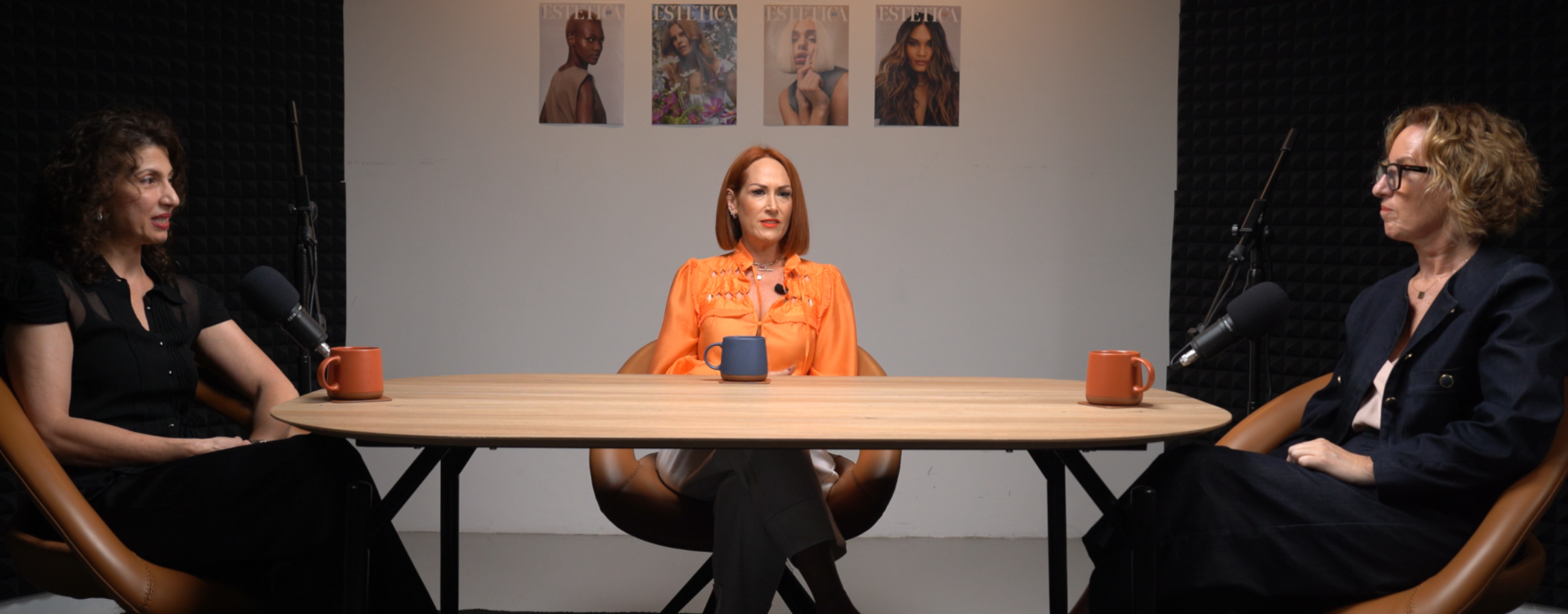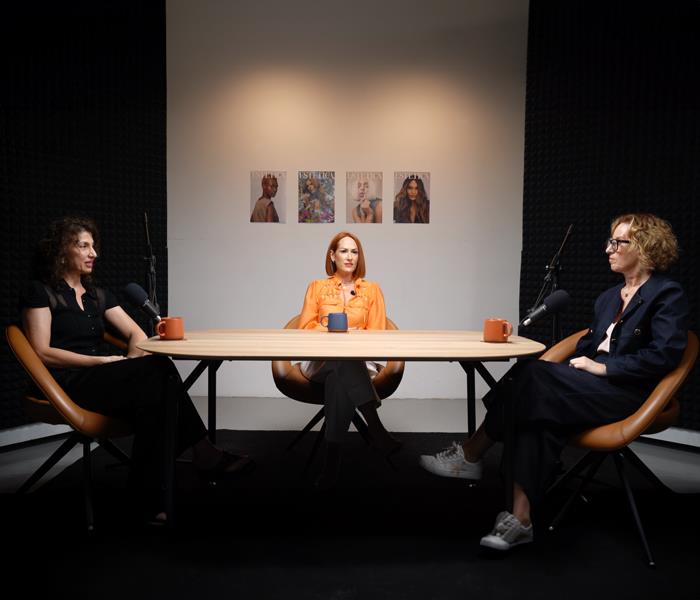- October 29, 2024
Lessons Learnt From Creating a Successful Salon with Dubai’s Leading Women Entrepreneurs
Welcome to “The Roundtable”—a series of industry discussions that brings together professional, influential, and innovative voices in the hair and beauty sphere, offering a raw and authentic look into what it takes to thrive in today’s competitive beauty landscape.

We kick off the series with three of Dubai’s leading women entrepreneurs and salon owners: Maria Dowling, founder of Mariadowling Salon; Ruksher Malik, co-founder of Pastels Salon; and Kelly Cyndrowski, co-founder of Salon Ink. They dive headfirst into the heart of business, starting their roundtable with the ultimate question: What’s the one thing about running a salon that no one warned you about?
“I think the one thing for me was that you have to work really hard. I think people think when they have their own business, that it's going to be easier, when actually it's not,” answers Maria. “It's 24/7, where you think you're going to be taking holidays, and you're going to be doing all the different things. Like, that's fantasy world.”
For Ruksher, it was the financial aspect. “I never worked with a team, I had no idea about numbers, or, you know, I had a money sense, but for me, the most important thing was that it's not just about being behind the chair… It’s actually knowing about the numbers, the data, there are so many things that, oh god, like 20 years, I've learned just so much,” she reflects.
The conversation flows effortlessly as they each start sharing their own take; Kelly, speaks about realizing the burdens of management. “I would say the biggest challenge being a business owner is the staffing aspect and handling the staff and dealing with the staff,” she says.
As they open up to the various struggles of starting a business within the indusrty, Maria points to a fact: “If you remember years ago when we were working in salons, the busiest hairdresser became the manager. Now when you think of that, that's crazy, right? If you're a busy hairdresser, how can you possibly manage? I mean, we've totally changed our idea of that.”
Being in the game for years, Maria, Ruksher, and Kelly have changed their ideas about many things. Kelly has had 33 years in the industry, 18 of them at her salon, while Maria has been in the business for 28 years, and Ruksher has had a total of 40 years of industry experience, between India and the UAE. Between pressure, finances, and staff - the first lesson they all learnt is that it wasn’t as easy as it seemed opening a salon.
So why does it seem like everyone’s doing it nowadays?— “Were we winging it,” they wonder.
“I was absolutely winging it. People were winging it. Because I just thought, cutting hair, and you do beautiful hair, and clients will keep coming, and that's it,” says Ruksher.
“Did we really know the figures?” Asks Maria. Kelly weighs in: “I have a business partner and I think we're very different personalities. So we're both amazing at what we do, what we do creatively, but from a business perspective, that's very different. And I think a lot of really great hairdressers can sit back and go, I'm so good at what I do. I'm going to open my own salon. But I think at the end of the day, they don't realize that as creatives, we're not necessarily geared to having a great business mind. And I think if you learn early to balance the creative and the business, I think you're going to be in a safe space as a business owner.” She resumes: “But if you're geared so much into the creative and thinking that that's going to unfold a successful salon or a successful business, I think sometimes it's quite a naive piece to sit in, because there has to be that balance. Because at the end of the day, you've got a budget.”
It’s not just about the skill set these days - they all agree. In an industry that can often be perceived as glamorous from the outside, this is the less glamorous side of running a salon.
“It's one of those things where you just learn, grow, evolve. It's like… To date, I make mistakes, learn from trial and error. To date, I'm learning constantly. I mean, it's like almost daily. I'm at the moment doing a marketing course,” says Ruksher. “Because marketing is driving me up a wall. If you don't understand it, you need to understand what your marketing team is talking about.”
Navigating such modern day business needs, could be a challenge. Maria seems to have found the right formula. “I found the good thing that helped me was to have good people around me. Like to have a good accountant, let's say to start with, but people who are good on reception, people who are able to manage different areas. I'm still able to work on the floor because I've got that support around me,” she says.

Being surrounded by the right team, is an essential element to success, as Kelly also asserts. “It took us 12, I think almost 12 years before we decided actually to take on a manager. So Sharon and myself were navigating everything to do with the business and it was when we moved into our second location where we increased our space, increased the amount of chairs that we had and we were like, we can't do this,” she recalls. “We had a massive wait list. We were like every single day, all day, every day, fully booked and we were like, we can't do this anymore. We really need to think about getting a manager and it took us 12 years to get to that point.”
Unrealistic standards that were set in the past is what Maria thinks made the job harder back then. “People were expected to manage. It's just not possible,” she says. But it’s not only the business expectations, but also, management in its standard sense, that has changed as a concept since. “I feel like now between social media, between managing people and their emotions —because it's a totally different concept now. Like before, if someone said they were tired, you'd say, Oh, just have a good night's sleep, you’ll be fine tomorrow. Now you've got to look into it and say: How are you feeling? How's your health? —I mean, everything's changed.”
That’s why Kelly has immersed herself in learning; so she can adapt to constant change in the industry, and constantly grow as a manager. “I've done emotional intelligence courses, emotional psychology courses. I've now done a human design course. So I can literally sit back and navigate that employee, how am I going to get the best out of that person now emotionally? Because the world has changed, especially with, you know, what we've all gone through with Covid,” she says.
Mentioning Covid automatically brings up the aspect of pivotal moments that challenged, and sometimes rocked the business to its core. As they delve into the obstacles faced during the pandemic, Kelly, Ruksher and Maria reflect on the challenges they were faced with along the way in their own journeys.
Kelly for instant, recalls a time when she came close to losing her business. “We had gone through quite a horrific situation. Was it three years before? When was Covid? 2020? Yeah. So we came out, in 2016 when we had our salon fire, and that was a really difficult space for us as a business. So if we talk about one of the biggest pinnacle points of us as a business, that was huge,” she says.
Although Kelly recalls the financial difficulties she went through and the emotional toll the ordeal took on her, the business emerged from the crisis, with a lesson her and her team learnt. “You can be as prepared as you want. You can be as resilient as you think that you can be. But when something like that happens, it's interesting to see how that plays out and how you manage that,“ she says.
“And how you as a business owner, how as an individual, how much you've grown, how much you've learned, you know?” Ruksher says back. She knows all too well what Kelly is talking about, because she also had a fire incident. “The first salon that we set up. It was like five… Was it? No, it was nine months into the business. I get a call in the middle of the night; the Oasis Mall is on fire. I said, what? And you won't believe it; our salon space was the only space that didn't get the fire,” she recalls. “Then I had to operate out of Stephen's because Stephen was still at the beach club those days, the Jumeirah Beach Club. I literally had to split my staff between two salons, thinking what should I do now? But I was so determined to reopen.”
These obstacles faced open the door yet again to the conversation of staff, and how significant the communication with the team is. Maria chimes in: “I mean, that's the beautiful thing, isn't it? About having your own business when you have a team. I don't have movement in my team, a little bit after Covid because people reassessed their lives and decided maybe they want to go back to England. That's when I had a bit of a shuffle. But other than that, I tend not to,” she says. “But it is great when you've got support of your staff so you don't feel like you're on your own. Because it takes time to get to that, to get to the point.”
“People are what makes the salons,” they all agree. Ruksher then adds: “It's happy team, happy clients. If they're happy with what they're doing, your clients are happy.”
Maintaining a good connection with the clients through all the ups and downs, is another business aspect these professionals had to make sure they did.
“I think that's where it's back to the family thing. If we're like a family, then we tend to, they become like… I know with my clients, I'm on third generation with some of my clients I've had for 25 years. Actually, I had someone pass away recently who had been with me 25 years.,” Maria shares.
“Some clients, they refuse to go to anybody else. That's why by force I have to do it,” jokes Ruksher. “Since they were 16 years old, and now they are moms and I've done their children and the children have been married. It's amazing, and it's, it's crazy. It's like for almost 40 years I've been doing their hair.”
Kelly breaks down this salon owner/ client experience they all share with their own clients; “I would just say old— I'm just going to be bold and say this, but old fashioned values in our industry,” she says. “We were raised in a hair dressing culture that was so different to today, and I feel like it's very much geared on skill set, which I think, is imperative.” She then continues: “But if I think about business model, I think 50 percent is great hairdressing, 50 percent is client journey and that experience with that client in the chair; how we're communicating with clients. I know that's something that Sharon and I have spent a lot of time developing with our team; is how are you speaking to your clients? How are you addressing them? What's your consultation like? Because I feel like a lot of hairdressing these days is not that. It's about a hairdresser behind the chair being really great at what they do, and that's all that matters. Zero connection.”

As they spend more time passionately discussing business values, clients and staff, later in the discussion, they’re asked to define their ‘I’ve finally made it’ moment. Maria, Kelly and Ruksher all had a lot to say. “We literally had our final loan repayment for a fire that we never caused come out of our account this morning. So I guess that's definitely a pinnacle, pinnacle point for us as a business,” Kelly shares. “I guess I wouldn't say we've finally made it. I think that's such an interesting piece, because I think the type of women that we are, the type of businesses that we have, I think we're always going to be very ever evolving individuals. How do you say “I finally made it?”
They all agree to Kelly’s point. “I think when you win an award, that's a great day, you know? When you're appreciated and also by the industry,” argues Maria.
“I think it could be broken into two sort of facets, because if we think about how we started in the industry as creatives, right? So I think if I were to measure that, I would probably measure that with being a highly demanded hairdresser with a wait list and producing really great figures for the business. I think that's a really great pinnacle point,” Kelly responds. “Then if you move that further into the career of, you know, colleagues around you and you then start educating those colleagues and teaching them and showing them your skillset, that's probably one kind of factor of ‘I finally made it creatively’, but then as business owners, Is it winning Salon of the Year? Is it winning Business Director of the Year? Like, do we measure or quantify our success based on an award or?”
Ruksher chimes in: “It was lovely to win the award, I have to say. We won that and we won the salon, we won the manager. It was lovely to win the awards. For us, I feel, yes, in a sense, moved on, because we don't really enter the awards anymore. But I find that for me, the team, like, the team always calls me the roadrunner. So I don't have that ‘finally made it’ moment.”
At this point, it’s clear to everyone around the table that opening your own business is not as glamorous as you may think. But it certainly is rewarding in more ways than one would expect. To these women, it has given them their friendship; a camaraderie and mutual respect that shone through, highlighting the power of women supporting women.
“I'm happy that, you know, I've navigated my 18 years alongside both of you. So thank you for the time you've given me and all the knowledge and experience. I appreciate it,” Kelly sumps it up.
As the three women reflect on their experiences and the lessons they’ve learnt, it becomes clear that their journeys are intertwined. They share not only the challenges of the hair industry but also a commitment to empowering one another and the next generation of stylists, all while facing adversity together, navigating the digital landscape, and dealing with generational differences by always going back to the values they share. In a world where competition can often overshadow collaboration, Ruksher, Maria, and Kelly exemplify the power of community.
Listen to their full roundtable discussion here.


